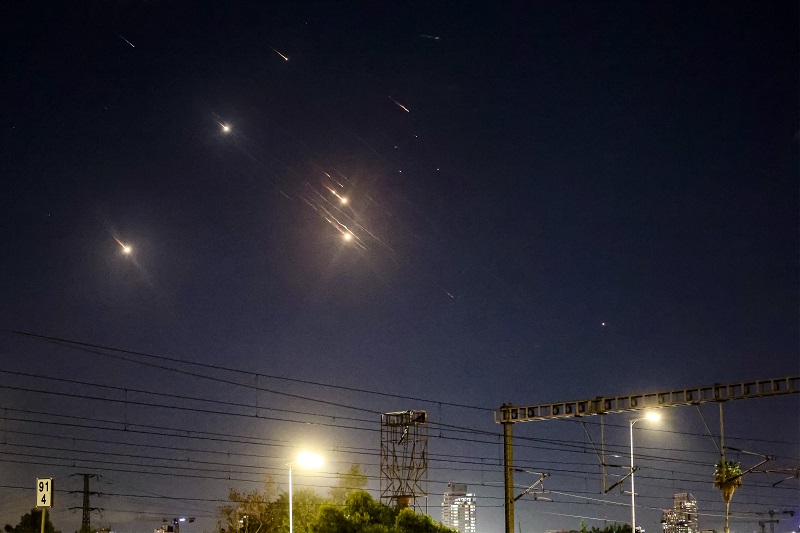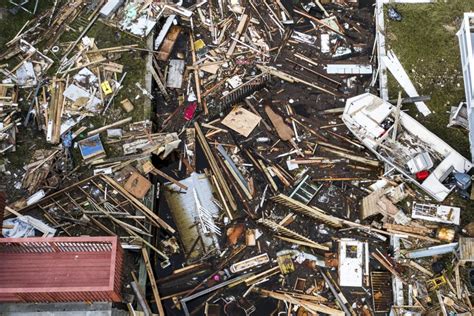Story by atecotzky@businessinsider.com
Violence in the Middle East, a massive labor strike among East Coast and Gulf Coast dockworkers, and the devastation of Hurricane Helene all struck with only five weeks before the 2024 presidential election.
Hurricane Helene and other storms dumped more than 40 trillion gallons of rain throughout much of the Southeast US — including two key swing states — late last month. The death toll crossed 180 this week, and hundreds of people are still missing as rescue efforts continue.
Just days later, more than 45,000 dockworkers at ports along the East and Gulf Coasts went on strike, kicking off a major work stoppage that’s already impacting the US economy and disrupting the supply chain.
These two US disasters unfolded as the conflict in the Middle East intensified this week. Iran launched at least 180 missiles into Israel on Tuesday, calling the attack a retaliation for a series of critical blows Israel has launched against Hezbollah in Lebanon in recent weeks and the killing of a Hamas leader in Tehran in July. The Iranian strikes came hours after Israel said it had launched a limited ground incursion into southern Lebanon, pushing the region ever closer to all-out war.

Political-science experts warn that the convergence of these three crises could have an impact on voters’ decisions.
When events such as natural disasters and geopolitical crises happen, voters usually either blame or reward the party in charge, depending on how that chaos shakes out, Peter Loge, a former Obama advisor who’s the director of the School of Media and Public Affairs at George Washington University, told Business Insider.
Both Loge and David Jones, an exit pollster who’s also a political-science professor at Baruch College at the City University of New York, said the incumbent party — the Democrats, in this case — is typically blamed for negative external events ahead of an election, which would put Vice President Kamala Harris at greater risk than former President Donald Trump.
This election, however, is anything but typical. Trump was shot in the ear during a mid-July assassination attempt. Soon after, President Joe Biden announced he was dropping out of the race following a disastrous June debate. Then, last month, federal prosecutors charged a different man with a separate assassination attempt against Trump.
What’s more, Americans aren’t choosing between a traditional incumbent president and a challenger. Their options include a former president and a current vice president, which Randall Adkins, a professor of political science at the University of Nebraska Omaha, said would complicate how these current crises affect the two campaigns.
“I think it’s going to be very difficult for the voters to understand a clear message and pick up the contrasting viewpoints from the two candidates on these issues,” Adkins said.
But that doesn’t mean the American electorate isn’t paying attention. In the final sprint to election day, voters tend to view global forces through a political lens, Loge said, and uncontrollable situations quickly become political talking points.
“Roughly four weeks out of a presidential election, it’s really difficult to separate global events from politics, which is unfortunate because these are global events that affect real people’s lives,” Loge said.
The vice-presidential debate between Sen. JD Vance and Gov. Tim Walz on Tuesday night offered both candidates a platform to address the crises.
Loge said that ahead of the debate, he anticipated Vance would work hard to link Harris to current events, while Walz would focus on her calm competence. His prediction came true within minutes.
The first question of the night centered on violence between Iran and Israel. In his response, Vance said Iran had received unfrozen assets from the “Kamala Harris administration,” trying to paint her as more responsible for America’s actions than Biden. Under Trump’s leadership, he said, there was “peace through strength.”
Trump’s running mate also went after Harris’ record on immigration and inflation, repeatedly saying that she’d failed to enact economic change while in office.
Walz, for his part, worked to paint Trump as the candidate of chaos and Harris as the stable choice.
“What we’ve seen out of Vice President Harris is we’ve seen steady leadership,” he said when talking about the Middle East. “We’ve seen a calmness that is able to be able to draw on the coalitions, to bring them together, understanding that our allies matter.”
Tens of thousands of longshoremen are on strike. BRYAN R. SMITH© BRYAN R. SMITH
The ‘sleeper issue’
The intensifying conflict between Israel and Iran raises foreign-policy concerns, and the devastation of Hurricane Helene has left large swaths of the American Southeast destroyed. But Jones, the pollster, said it was a brewing economic crisis from the dockworkers strike that stood to really disrupt the presidential race.
“The sleeper issue that could end up making the most difference is the dockworkers strike, and that’s because the No. 1 issue that Americans say when they talk to pollsters is the economy,” he told BI.
The strike will inevitably lead to complications with the nation’s supply chain, which, in turn, could eventually lead to inflation — an outcome that would seriously hurt Harris, he said.
Logistics experts told BI that a strike lasting a week or two would create backlogs but minimal widespread economic costs. Anything longer, however, would result in upward price pressures and shortages, especially at the grocery store.
And the affected ports are already feeling the impact: more container vessels are anchored than usual, and analysts at JPMorgan estimate the shutdowns could cost $5 billion a day.
“There’s a lot of evidence that when people are unhappy with the economy, they blame the incumbent presidential party,” Jones said.
Republicans typically have the upper hand on economic matters among voters, but there’s increasing evidence that Harris’ policies on the matter are starting to sway Americans.
And while the dockworker strike could spell trouble for Harris, it’s also the only crisis of the three that has any real chance of ending before election day, Adkins noted.
The war in the Middle East will most likely worsen before it gets better, and the hurricane cleanup could take years. But the longshoremen and ports could reach a deal before voters head to the polls, Adkins said.
Jones said the strike ending could give Harris an opportunity to celebrate; he said he could imagine a photo of her shaking hands with smiling dockworkers.
Most voters have already decided. Grace Cary/Getty Images© Grace Cary/Getty Images
Most voters have already decided
Regardless of how the current crises evolve in the coming weeks, the presidential election is ultimately set to be decided by a small number of voters in a small number of states.
And Jones said the country’s intense partisanship also means external events just don’t sway voters as much as they used to.
“I think at the presidential level right now, probably 19 out of 20 people have already made up their mind,” Adkins said.
In 2020, Biden won the election thanks to fewer than 45,000 votes in three key states, Arizona, Georgia, and Wisconsin.
Given how close past presidential races have been, if even a few thousand voters in key districts find themselves energized by war in the Middle East, angered by the impact of the dockworkers strike, or hurt by Helene, the crises could move the needle come November.
What matters most now is how the candidates’ messaging lands with specific communities impacted by these crises, Loge said. While those in the swing states of North Carolina and Georgia may be most focused on hurricane cleanup, Loge said voters in must-win Michigan might be more concerned with the ongoing violence overseas.
The Biden-Harris administration would be wise to project calm competence in the weeks ahead, Loge added. He said that meanwhile, he expected the Trump campaign to continue its messaging promoting Trump as the candidate of strength and Harris as the candidate of weakness.
Which message voters respond to most will become clear on Election Day.




Dem-socialist policies will destroy this county.
As Mr. Biden’s partner for the last three-and-a-half years, Ms. Harris faces the added burden of supporting the agenda of a president who has become deeply unpopular. Her own policies didn’t even get her past the first debate of 2020.
What is clear is that a leftist from Berkeley such as Harris would weaken our economy, national security, and individual liberty and deprive those moderates and independents of a real option in the Democratic Party.
Congressional ratings groups tell the tale of her time in the Senate. Based on her votes, Harris was rated the most liberal member of the Senate in 2019, further left than either Sen. Bernie Sanders (I-VT) or Sen. Elizabeth Warren (D-MA), by the nonpartisan group Gov Track. The liberal advocacy group Americans for Democratic Action, which also compiles ratings based on major votes, gave her perfect 100 scores in 2017 and 2018.
Harris’s policy positions were consistently far left. She supported ending private health insurance, passing the Green New Deal, imposing a carbon tax, banning fracking, eliminating cash bail and mandatory minimum sentences, and, as we saw in her 2019 debate with Biden, forcing busing of school children to achieve racial integration.
In the White House, Biden put Harris in charge of two significant priorities: stopping illegal migration and leading the National Space Council. Her liberal policies and poor execution contributed to at least 12 million illegal crossings at the border, far more than during former President Donald Trump’s presidency. Rather than reduce regulations to promote America’s space industry, as chairwoman of the president’s Space Council, Harris drafted new policies that promoted the imposition of new burdensome regulations and legislation on the space industry under the guise of complying with the 1967 U.N. Outer Space Treaty. She has also vigorously promoted increasing diversity, equity, and inclusion rules in astronaut selection and roles.
VOTE REPUBLICAN